For American stuck in Gaza, escape from war had a painful cost: Leaving family behind
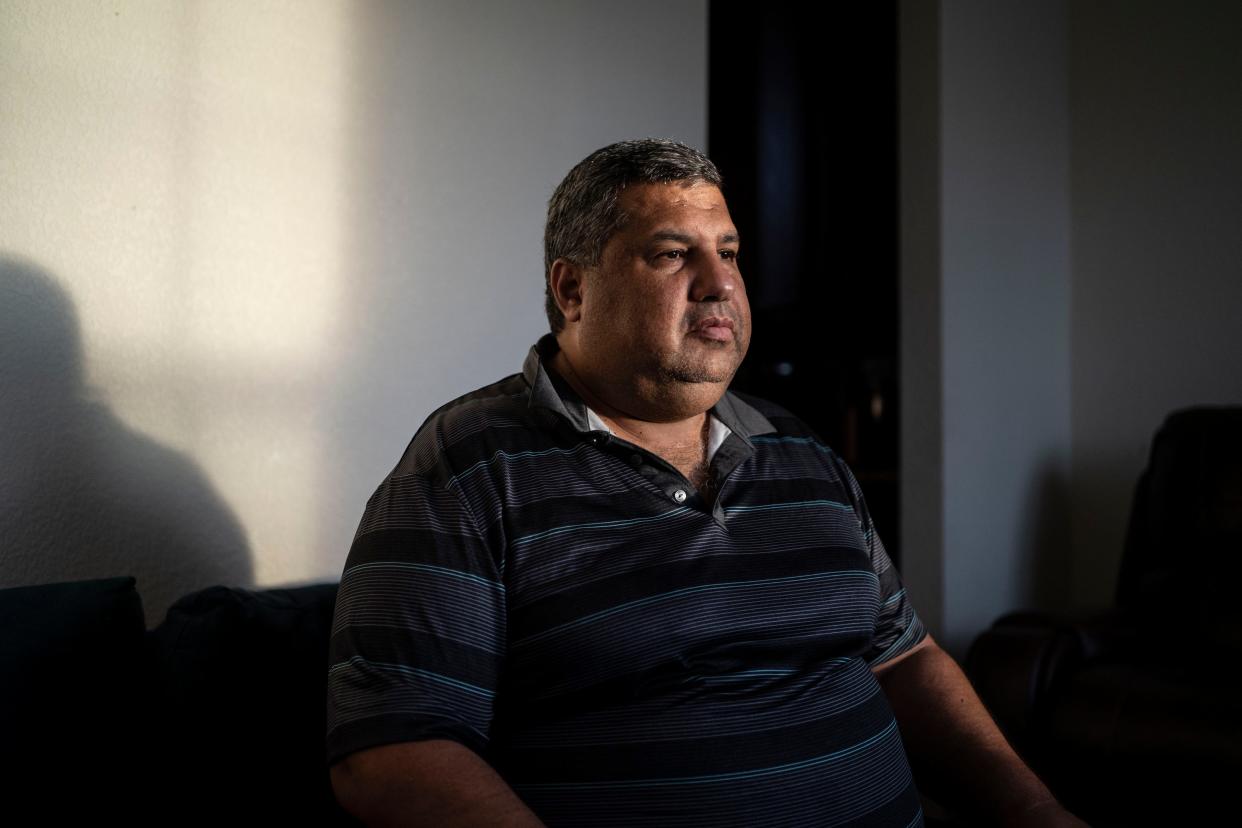
DENTON, Texas – As Israeli missile strikes whistled and exploded around him in Gaza City – rattling his family’s home and demolishing a vegetable market, a neighbor’s house, a supermarket – Yaser Betar thought of his wife and four children back home in North Texas.
Betar, 50, a naturalized U.S. citizen, was visiting relatives when the Israeli offensive against Hamas began, trapping him in his native city. For 27 days, he bathed with seawater, hunted for fresh drinking water and moved from home to home, trying to flee the territory as explosives rained down.
More than 7,000 miles away in Denton, his family followed every newscast and social media post from Gaza, bracing for the one that would announce his death. As the missiles struck ever closer, killing neighbors, family and friends, Betar began doubting his chances of ever seeing them again.
“I was expecting to die at any moment,” Betar told USA TODAY. “When you hear those airstrikes, you think the next one is coming to you.”
Betar was among more than 400 Americans and their family members, around 1,000 people, who found themselves trapped in Gaza as Israel unleashed their response to the Oct. 7 attacks by Hamas, which killed more than 1,400. Israel’s bombing campaign has killed more than 10,000 Palestinians in all, according to the Hamas-run Health Ministry in Gaza. Israeli military officials claim they're targeting Hamas militants, who launch attacks from civilian buildings.
More: 'Preparing to die': Palestinians flee as Gaza braces for Israeli ground invasion
Betar was one of the luckier ones: He managed to flee Gaza last week and reunited with his family in Denton late Saturday. He corroborated his story through video clips and photos he took on his smartphone.
As the conflict enters its fifth week, U.S. officials in the region continue to urgently try to extract U.S. citizens from the combat zone. They’ve managed to help get out “more than 300 Americans, lawful permanent residents and their families,” though more remain, Jonathan Finer, deputy national security adviser, said Sunday on CBS’ “Face the Nation.”
Trapped in Gaza as bombing begins
Born in Gaza City, Betar is one of 11 brothers and sisters, all of whom still live in Gaza. His life story traced a familiar path for Palestinian immigrants who want to escape the instability of Gaza by living abroad.
After graduating from high school early at 16, he moved to the United States to live with a brother who was studying in San Angelo, Texas. Betar said he attended Rice University in Houston and North Texas University in Denton, 40 miles northwest of Dallas, studying computer science.
He became a naturalized U.S. citizen, opened a restaurant – Jasmine’s Mediterranean Grill – and raised a family with his wife, Nisreen, now 44. The two have four children: an 18-year-old daughter, Ayay, and three younger sons, Ammar, Ahmed and Yosef.
Denton – where Dallas Cowboys’ final scores occupied headlines rather than cross-border skirmishes or rocket attacks – offered a pace and lifestyle far different from the one he knew in Gaza City. But he returned to his home country often to visit his father and siblings.
In 2021, he took his family for the first time to meet their grandfather and cousins, staying for three months. It was the best way to see them: Since 2005, Israel and Egypt have tightly controlled entry in and out of the Palestinian territory.
Last month, Betar traveled to the territory alone, planning to stay for a month. He arrived at his family’s home in Gaza City on Oct. 3. He caught up with siblings and attended mosque on Friday with his father, Hussein Betar, who is 88.
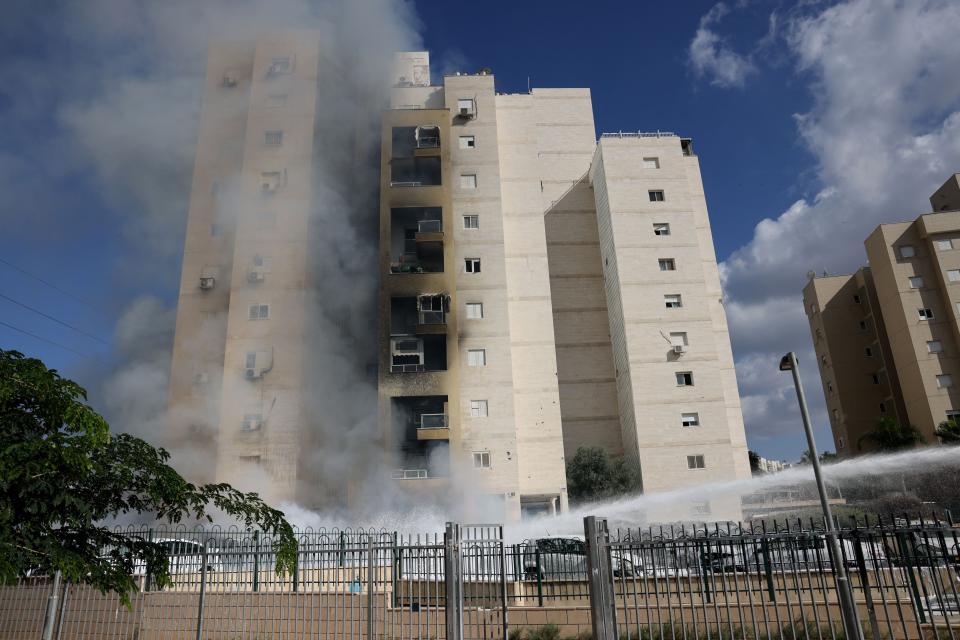
On Oct. 7, he planned to drive to the villages on the outskirts of Gaza to visit his sisters. Instead, he was awakened with a jolt at the sound of rockets being shot from somewhere near his home toward Israel. He turned on the TV to see Hamas fighters breaching the perimeter fence surrounding the Gaza Strip and invading Israel.
While some Gazans relished the invasion, taking advantage of the breach to loot nearby Israeli homes, Betar said he was filled with dread: He knew what would follow.
“Revenge from Israel was going to be horrible,” he said.
As he predicted, heavy shelling began on Sunday morning. Betar and his father moved to a brother’s house in another part of Gaza City. When they returned later that day, their street was a sea of concrete rubble. A neighbor’s home was reduced to a jagged pile of debris; most of the family died inside, Betar said. His father’s home was still standing but every window had been blown out, its window frames twisted like pretzels.
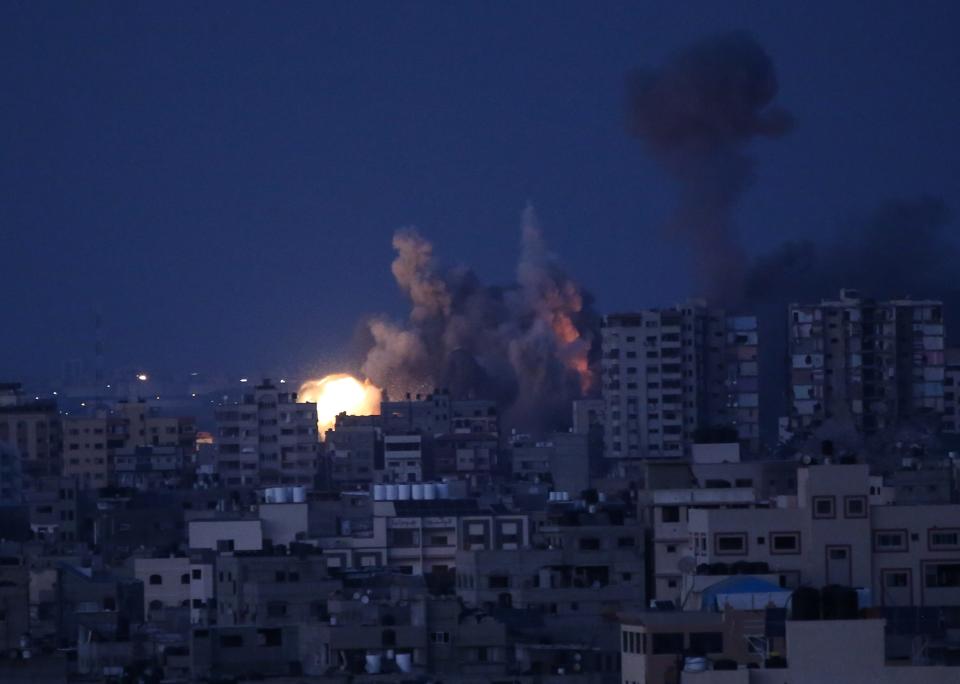
A few days later, pamphlets rained down from Israeli jets, warning everyone to leave north Gaza. Betar described the situation to a USA TODAY reporter, via WhatsApp and a brief phone conversation, with yelling and car horns blaring in the background.
“Hundreds of thousands of people are walking to leave Gaza City to go to the south border because they are preparing for a big invasion,” he said. “They say if you stay in the city you will be killed.”
Betar packed up what he could and moved to a brother’s friend’s house in the Khan Younis neighborhood farther south, while his father went to stay with Betar’s sister in another part of Gaza. At the house where Betar went, more than 100 people crammed into a four-story home. He slept on the floor on a blanket, using a couch cushion as a pillow. They lived mostly on watery soup and sandwiches.
Each day, every hour, rockets whistled in and hammered the neighborhood. Each explosion rocked the home and rattled windows.
“It was like being in an earthquake,” Betar said.
One morning, a rocket somehow squeezed in between two buildings and exploded in a supermarket on the ground floor of the building where he was sheltering, he said, violently shaking the structure and killing more than 10 people. A few days later, a nearby café where he often ate breakfast was demolished by an explosion next door. Betar said he watched as rescue workers pulled bodies out of the rubble, some intact, others in pieces.
In recounting the scene, Betar brought out his phone to play a video taken from a closed-circuit camera of shoppers at the supermarket the second before the rocket struck, then pictures of the blown-out cafe. USA TODAY couldn’t independently confirm the validity of the images.
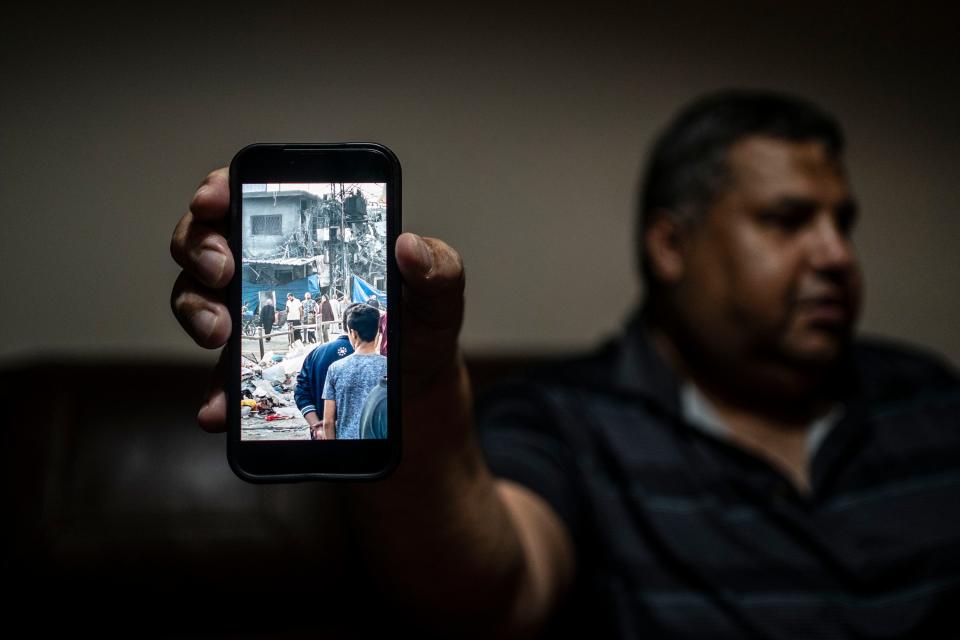
“They bombed early in the morning,” he said, swiping through photos of rubble and debris. “If I was there, I’d be fried.”
The families pooled their money and bought saltwater from a vendor who pumped it from the nearby Mediterranean Sea so they could wash dishes or take baths. Potable water was nowhere to be found, so Betar drank warm Cokes or kids’ mango juice boxes. With no electricity, he paid a vendor to charge his phone by connecting it to a car battery.
When he had enough of a charge, Betar registered his email with the U.S. Embassy in Jerusalem. On Oct. 20, he received an email from the State Department, advising him that the Rafah border crossing with Egypt in southern Gaza would open the next day for foreign citizens.
Betar packed his things into his carry-on roller suitcase and someone gave him a lift to the crossing 5 miles away early the next morning, where he joined others in line.
By 3 p.m., however, guards told them to go home: the crossing wasn’t opening that day after all.
‘Bad days': Families in U.S. try to help
As Betar navigated life in Gaza, his wife, Nisreen, clung to normalcy in Denton. She shuttled the kids to school and went to work each morning in the cafeteria of the younger boys’ elementary school. But she checked her phone compulsively, hunting for any scrap of news or word from Betar.
At night, she slept one or two hours then woke up reaching for her phone. Betar called when his phone worked, but days would pass without hearing from him. She cried often.
“It was bad days,” said Nisreen, who is originally from Qatar. “I kept thinking, ‘What will I do with the kids if something bad happens to him?’”
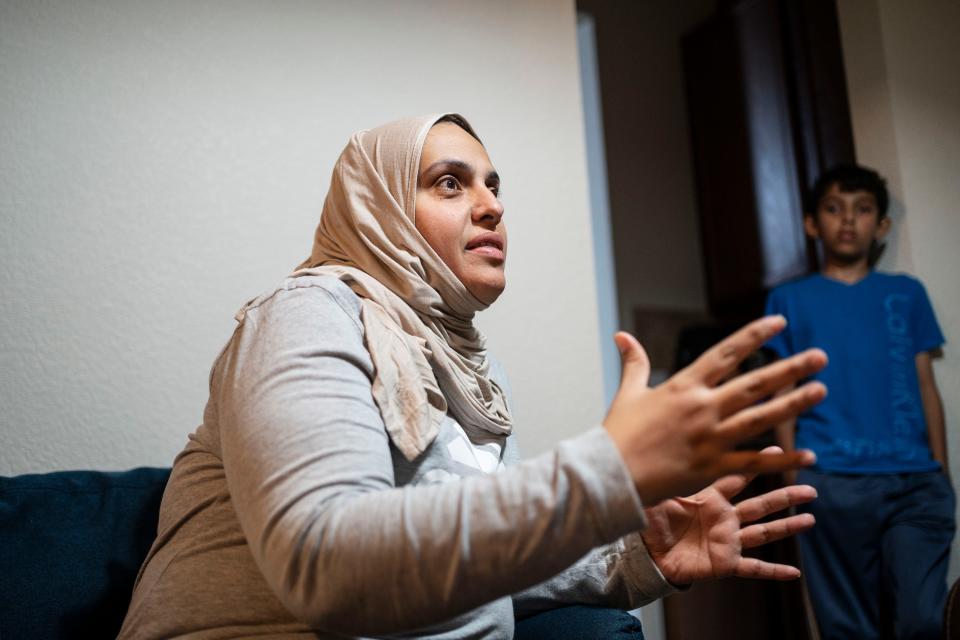
Nisreen wasn’t alone in her fears.
As Palestinian Americans realized their loved ones were trapped in Gaza, they shared their stories with U.S. media outlets and posted their pictures on social media, hoping to push the U.S. government to act. Israeli Americans did likewise with photos of those kidnapped by Hamas.
In Houston, Mai Abushaaban, 22, scanned headlines and made repeated phone calls, trying to get her mother and sister out of Gaza. Like Betar, they had gone to visit family and got stuck as war broke out. Both are U.S. citizens.
Abushaaban tried to glean information from U.S. officials. Her mother and sister attempted to leave through the Rafah crossing four times, as Abushaaban tried to get their names on a list of foreigners allowed to leave. Each time, they got turned away.
On their fourth attempt, a bomb exploded nearby, she said.
“It was just a huge mess, so much chaos,” said Abushaaban, a graduate student at Arizona State University.
The U.S. Embassy in Cairo told her the embassy in Jerusalem was in charge of the list, she said. “I'd call the Jerusalem embassy and they'd be like, ‘Oh, well, Cairo is in charge of the list.’ It was just a bunch of pointing fingers.”
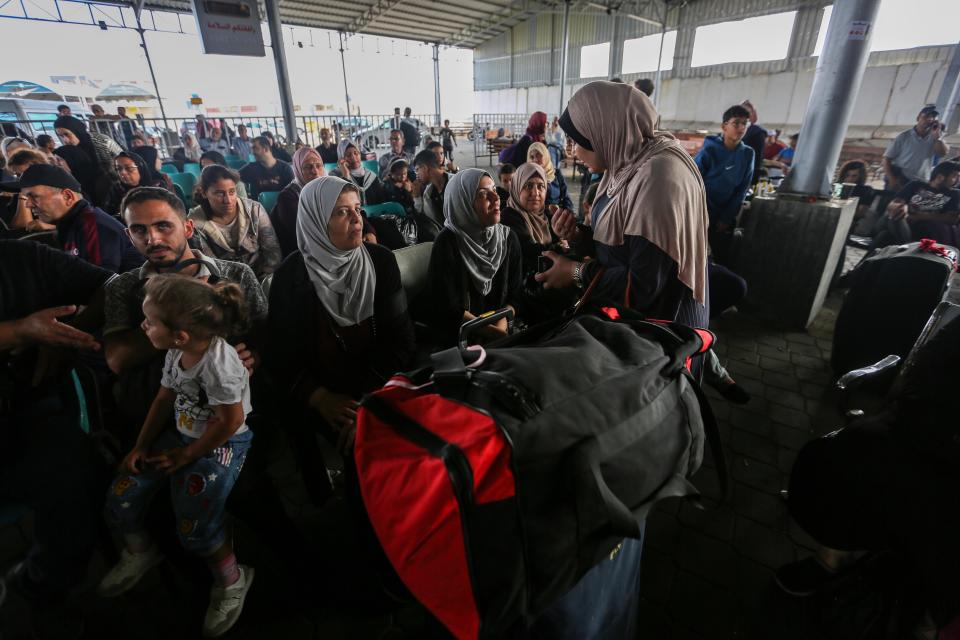
The mother and sister were finally able to leave Gaza on their fifth attempt. They’ve joined a group of other Palestinian Americans suing the Biden administration for not doing enough to help get them out of Gaza. On Sunday, an explosion struck Abushaaban’s great-grandparents’ house, where her family has lived for four generations and where other relatives were sheltering from the war.
Since cell service was again cut off in the area, she said she doesn’t know who survived the explosion and who didn’t. Being so far from the conflict, Abushaaban said she felt helpless.
“I was able to help my mom and sister get out,” she said, “but what about everyone else?”
An email, a donkey cart and a final attempt at escape
As October turned to November, Betar checked his phone each time he managed to get enough power, hoping for official word.
On Nov. 1, unable to sleep with the sounds of window-rattling explosions nearby, he pulled up his email at around 3 a.m. and his heart leapt: A message from the State Department said he was “expected to be on a list to be allowed to enter Egypt.” He should be back at the Rafah crossing at 7 a.m.
As he gathered his things again, some family members congratulated him, others asked him to take them along. One 30-year-old nephew, who had a wife and two young children, pleaded to go with him. Betar apologized, saying the list was only for U.S. citizens and their immediate family.
“I was so sad,” Betar remembered. “I wish I could take them all.”
When he called his father at his sister's house, his father started crying. “Just leave, leave,” he told Betar. “If we all die, at least somebody will survive.”
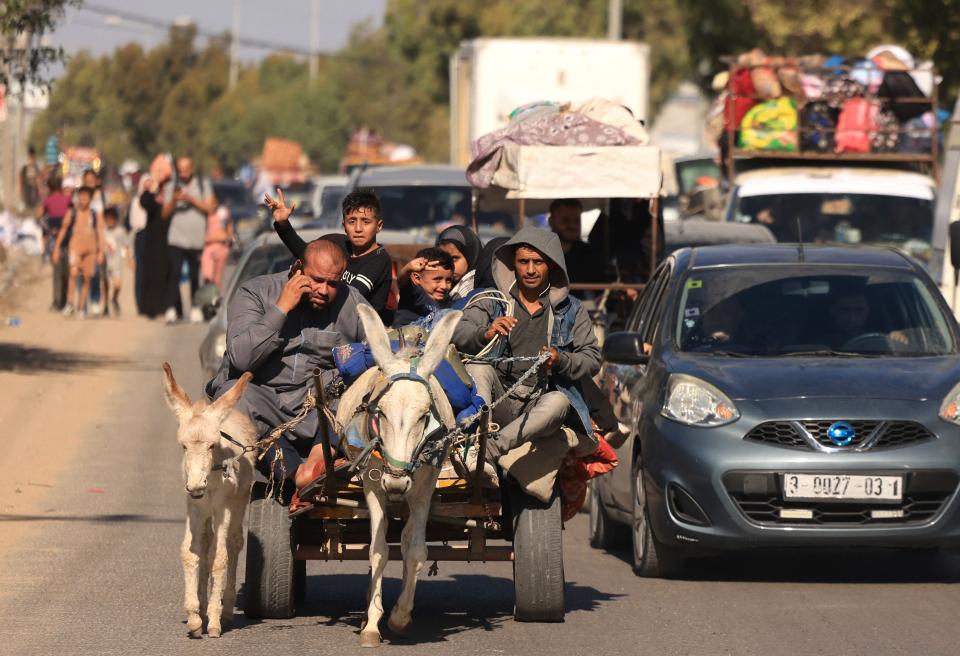
Betar, however, faced a final challenge: There was no fuel, since Israel had cut off all shipments into Gaza, which meant no taxis or cars to drive him to the crossing. Instead, he paid a man with a donkey-pulled cart $50 to take him 3 miles to a brother’s house farther south, and his brother drove him the final few miles.
At the Rafah crossing, throngs of people shouldered their way to Palestinian border guards, who sat at desks and checked names on passports against those on printed-out lists of foreigners allowed to leave. American, Belgian and British citizens mingled together, waving passports and hoping for their chance to exit the embattled territory.
Yaser Betar. The guard matched his name to the one on the list and waved him through. Betar walked out of Gaza and, as he approached the Egyptian side, saw a contingent of U.S. military personnel in fatigues holding a small American flag.
“Are you American?” they asked him. For the first time since the bombs began, Betar cried.
‘There will be no Gaza’
At the crossing, Betar quickly downed two bottles of cold water, then stuffed three more in his suitcase. The water, he said, “was excellent.”
He and Americans were driven to Cairo, where U.S. officials paid for two nights at The Nile Ritz-Carlton.
On Saturday morning, Betar boarded a Turkish Airlines flight to Istanbul and then to Dallas Fort-Worth International Airport. Twelve hours later, his family came to the airport to pick him up. He hopped in the front seat.
Back home at their five-bedroom house in Denton, Betar enveloped all of them in a huge hug, took a 30-minute hot shower and fell fast asleep.
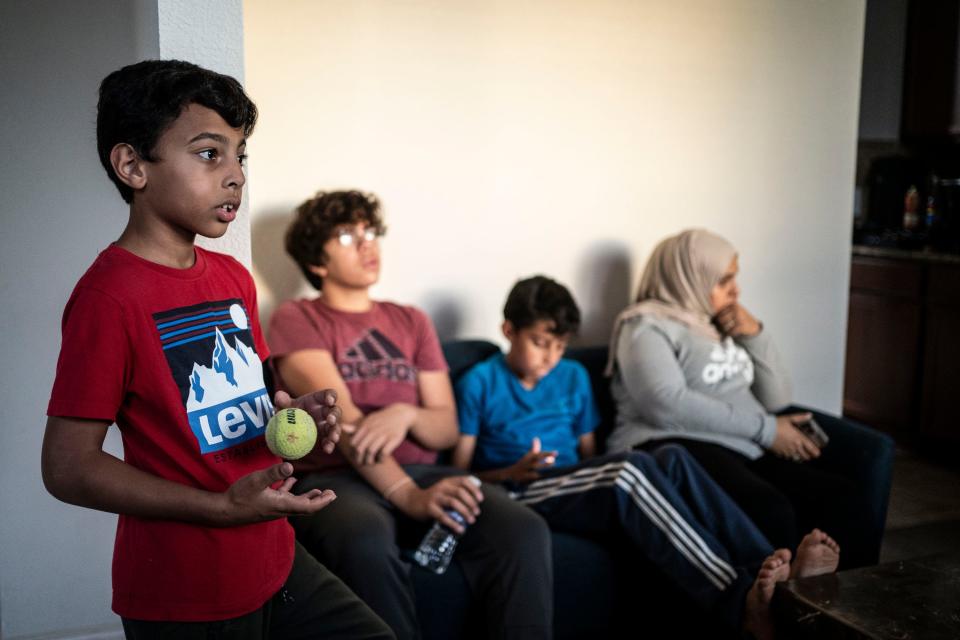
Sitting in his living room on Sunday, surrounded by his three sons who were curious to hear his story, Betar recounted his journey and reflected on what’s happening now in his homeland. Earlier in the day, he had received a call from a relative in Gaza: The husbands of three nieces who had stayed behind in a house in north Gaza had been killed in a rocket attack. He was told there wasn’t enough left of the bodies to properly bury.
Betar said he’s constantly worried about his father, brothers and other family members left behind. But he won’t be returning to Gaza anytime soon, he said. Too risky.
“I’m scared because of these kids,” he said of his own children. “All the time I was thinking of them. I was thinking, ‘What are they going to do if I die?’”
Betar said he and many other Gazans always favored a two-state solution and supported Palestinians and Israelis living side by side. He’s no longer sure that could ever happen.
Asked what’s next for Gaza, Betar paused.
“If Israel keeps doing what they’re doing, there will be no next,” he said. “There will be no Gaza.”
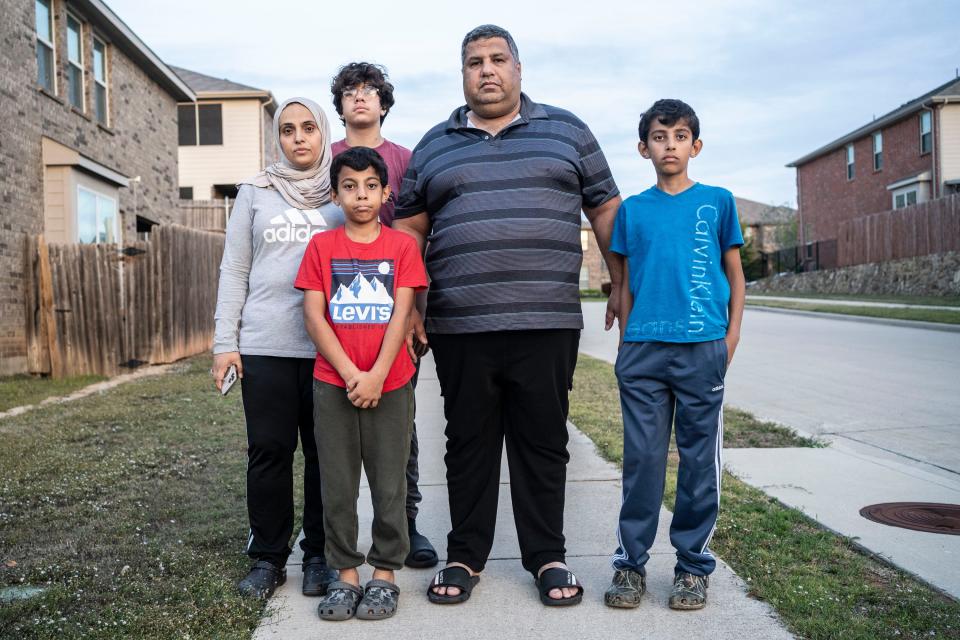
This article originally appeared on USA TODAY: American who fled Gaza brought harrowing stories back to Texas

